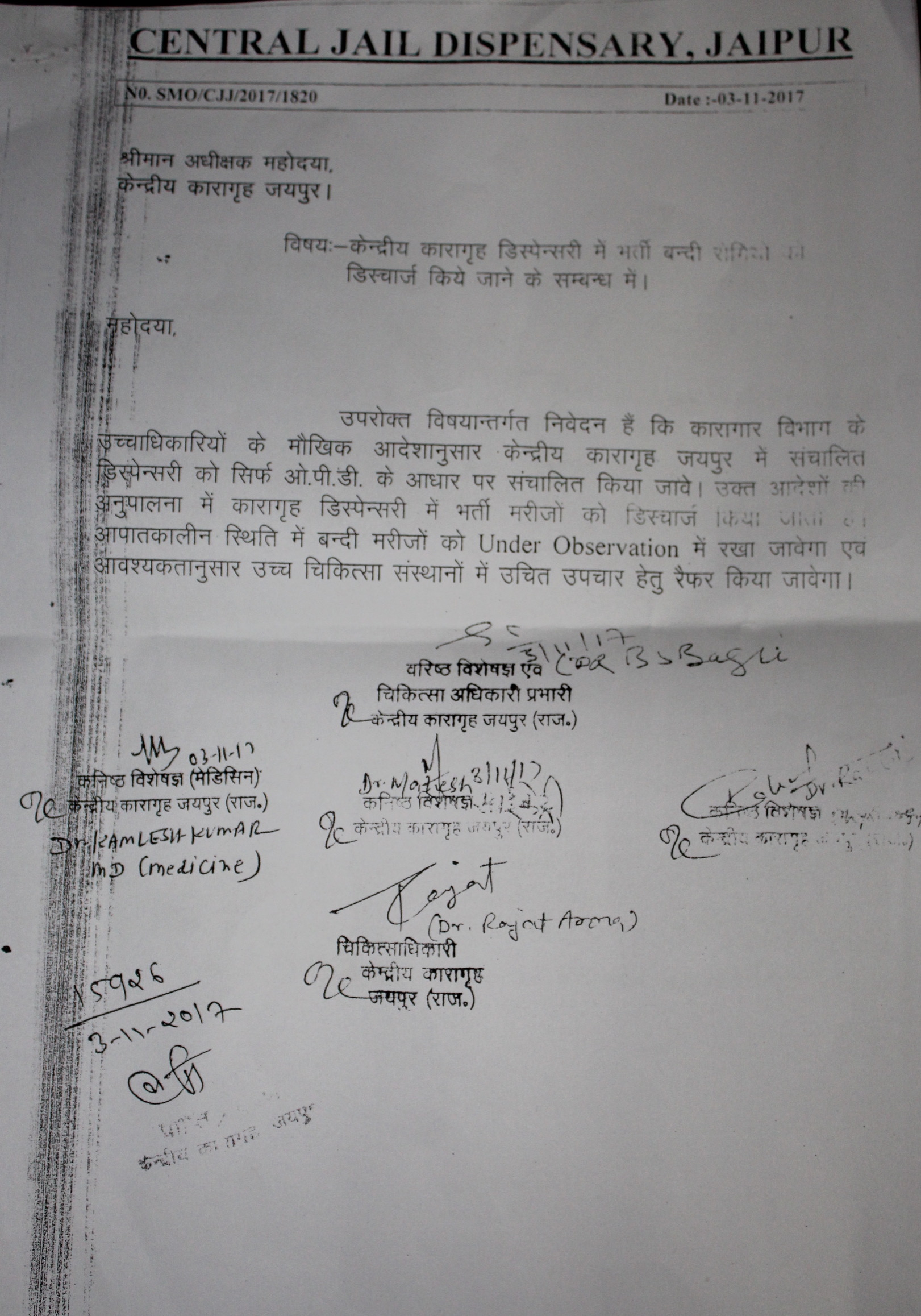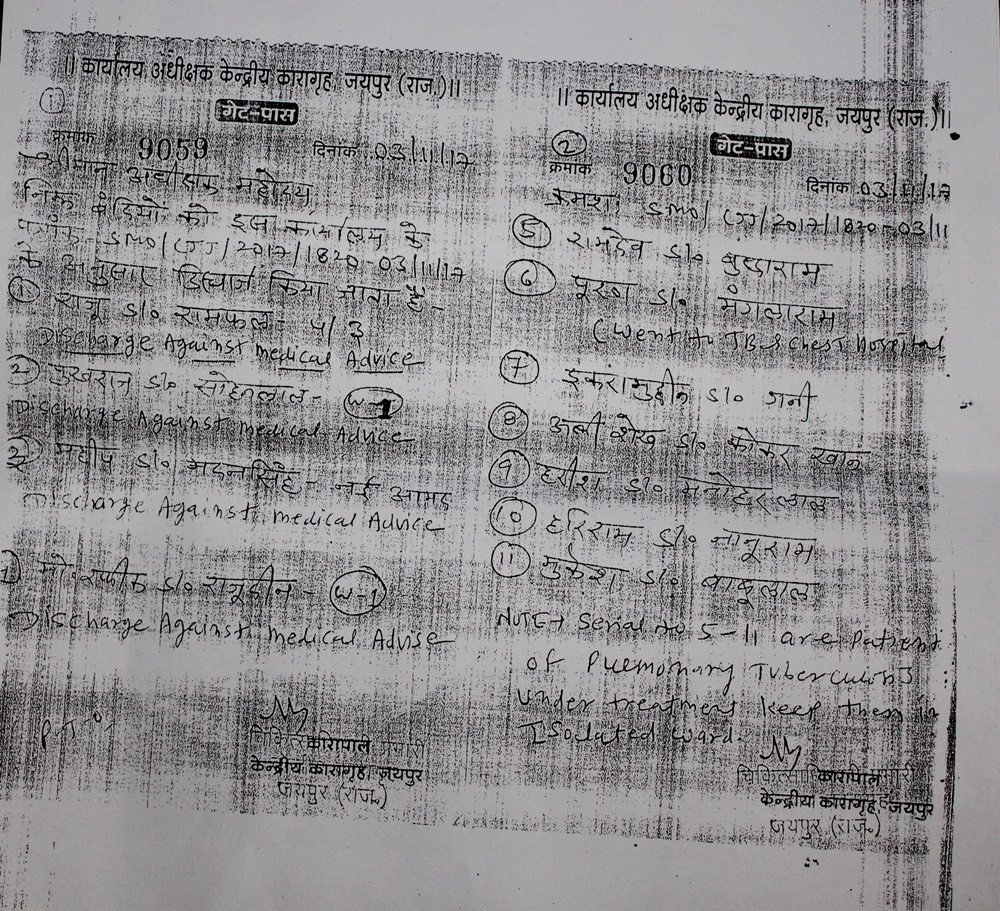
Shruti Jain is a reporter at The Wire.
Twenty-two discharged prison inmates were suffering from pulmonary tuberculosis, blood cancer and hypoglycemia.

Jaipur: In a verbal order last week, the Jaipur Central Jail authorities directed prison medical officers to operate the prison hospital as an outpatient department (OPD)/dispensary, which, in effect, requires doctors to discharge even the critical inmates undergoing treatment to general barracks.
Following the orders, the central jail’s medical officers – Kamlesh Kumar, Mahesh, Rahul, Rajat Arora and B.S. Bagdi – on November 3 submitted a letter to the jail superintendent giving details of 22 inmates they had to discharge as directed.
Seven of the prisoners – Ali Sheikh, Ikra Muhin, Harish, Hariram, Puran, Ramdev and Mukesh – were ‘pulmonary tuberculosis patients under treatment’ and seven others – Mohammad Rafiq, Pukhraj, Mahip, Deepak, Raju, Guruji, Maharaj Singh and Raju – patients of blood cancer, hypoglycemia and amputees, were ‘discharged against medical advice.’
The Prisons Act, 1894, states: ‘In every prison, a hospital or proper place for the reception of sick prisoners shall be provided.’
The Rajasthan Jail manual states: ‘If it is necessary to detain a prisoner in the hospital for more than 24 hours under medical observation, he must be admitted to hospital.’ For the last 30 years, the Jaipur Central Jail hospital had the provision of 25 beds for in-patients. Prisoners from other districts and sub jails were also transferred here for treatment.

However, jail authorities now claim that no hospital ever existed in the prison. Speaking to The Wire, Sunil Kumar Mehrotra, DG (Prisons) said:
“Jaipur Central Jail has only a ‘dispensary’ and not ‘hospital’ as per the prison manual. How can we ask the doctors to discharge the patients when in the first place there is no facility to keep indoor patients in the jail? The dispensary is meant only to provide primary care. However, the prisoners are referred to SMS hospital, if the need arises.”
Pointing to the misuse of the hospital facility by prisoners to avoid staying in the overcrowded barracks, Mehrotra said, “Sone ki jagah alag hoti hai aur marijo ke ilaaj ki alag (place to sleep is different from the place where the patients are treated). This is judicial custody and we are supposed to check that no VIP treatment is given to any prisoner.”
When asked about the Rajasthan jail manual, which mentions hospital instead of dispensary, he replied, “It’s just a dictionary meaning. In reality, there are no facilities in the prison like hospital. Hospitals run 24×7 but the dispensary facility in the prison shuts in the evening.”
Doctors The Wire spoke to were quick to counter the DG (Prisons) arguments.
“Patients of tuberculosis and cancer were treated in the prison hospital and doctors with a Doctor of Medicine (MD) degree were posted there. How can it be called a dispensary?” said Kamlesh Kumar, a medical officer at the Central Jail.
Also read: Why We Need to Talk About the Condition of India’s Prisons
S.K. Jain, member secretary of the Rajasthan State Legal Services Authority, who was on a routine inspection at the Jaipur Central Jail on Saturday along with two deputy secretaries, said that a few prison inmates who were discharged were in critical condition:
“Prima facie, the jail authorities have done wrong in forcing even the critical patients to shift to barracks. If there was an issue with some inmates who were occupying the hospital beds for unusually longer period of time (more than a year, for instance), then those inmates should have been identified and ordered to vacate instead of giving a uniform order for all.”
However, the jail superintendent called the discharge order ‘a routine process.’
“The dispensary is still working. It was a routine process to vacate the beds unnecessarily occupied by few prisoners and put to use for the needy ones,” Monika Agarwal, acting superintendent of the Jaipur Central Jail said.
Speaking to The Wire, Kamlesh Kumar, MD (medicine), one of the signatories of the letter to the jail superintendent, accepted that they had been ordered to discharge all the patients from the wards, irrespective of their health status.
“After the inspection of the high court team, the jail authorities have sent some prisoners back to the hospital, without our permission.”
Prisoners’ right to healthcare
The Jaipur jail department’s order to discharge the critical prisoners admitted in the prison hospital has rendered the Supreme Court judgment on a PIL filed by Justice R.C. Lahoti in 2013 an empty formality. The PIL was against inhumane conditions of 1,382 prisons, and focused on how the availability of medical care for prisoners was just a formality on paper.
On admission to jail, each prisoner is medically examined to diagnose and treat any disease they may be suffering from. This is especially crucial to prevent the spread of contagious diseases like tuberculosis. The medical officer is supposed to make arrangements for all ill prisoners. If a prisoner requires urgent medical treatment, she or he may be transferred to another hospital or facility outside the prison premises. Each admission and discharge from the prison hospital is recorded on the prisoner’s history ticket, along with details of their illness. Even when prisoners are discharged, the officer needs to provide guidelines permitting that they resume work, or prescribe a change in the work assigned.
The Supreme Court, in a series of cases, has held the ‘right to healthcare’ as an essential ingredient under Article 21 of the constitution of India which reads, “No person shall be deprived of his life or personal liberty except according to a procedure established by law.”
Prisons in India, covered under the state list, are the primary responsibility of the state governments. Their administration is governed by the Prison Act, 1900 and respective state prison manuals.
The state has an obligation to preserve life whether a person is innocent or a criminal liable to punishment under the law. The universal declaration of human rights has recognized the right to conditions, adequate for the health and well-being of all.
Prison overcrowding leads to spread of contagious diseases
As per the latest statistics of the jail department of Rajasthan, Jaipur Central Jail is overcrowded. It has 1,774 inmates against a capacity of 1,173.
Prisons are often high-risk environments for tuberculosis transmission because of severe overcrowding, poor nutrition, poor ventilation and limited access to healthcare.
While the standard rules provide for segregation of all cases of pulmonary TB in special wards – to guard against the spread of infection to other inmates – the absence of an indoor facility at the Jaipur Central Jail forces them to stay in the overcrowded barracks, jeopardising the health of thousands of other inmates.
Shruti Jain is a freelance journalist.



